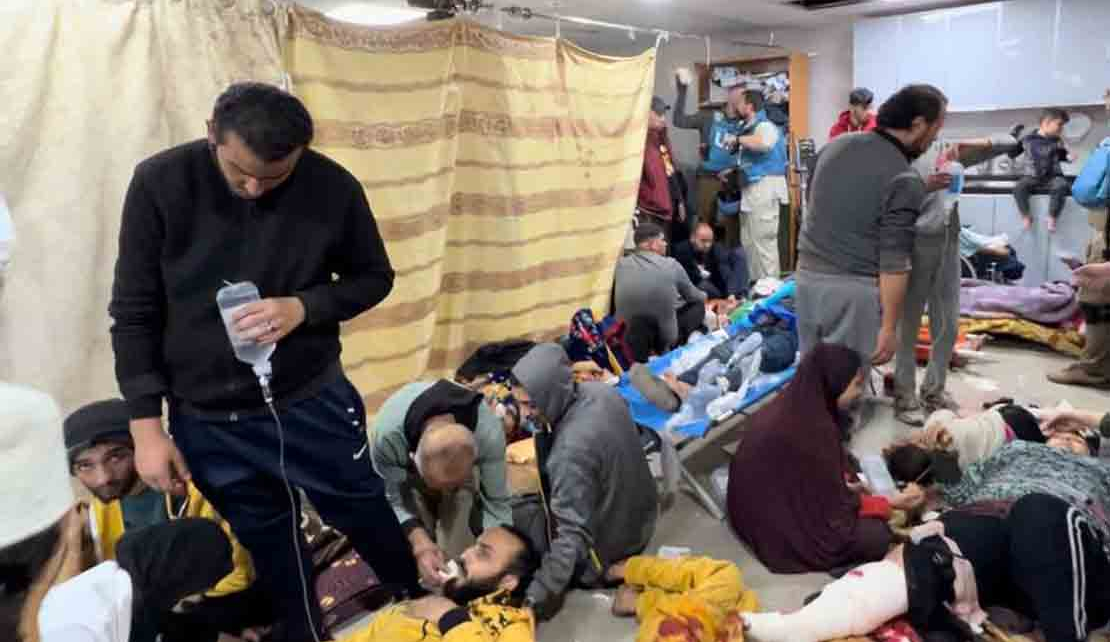GAZA CRISIS | Another hospital facing dire shortages, warns WHO

KINGSTON, Jamaica, January 9, 2024 - As the war on Gaza reached its 93rd day on Sunday, South Africa has levied grave accusations against Israel, asserting that its military actions including indiscrtiminate bombings in Gaza amount to genocide. Amidst this international outcry, reports from the United Nations paint a harrowing picture of relentless Israeli bombardment, with devastating consequences for the Palestinian people of Gaza.
In the midst of chaos and destruction, UN humanitarian agencies have sounded the alarm over significant casualties, disproportionately affecting women and children. Medical teams, overwhelmed and underequipped, struggle against the odds to provide life-saving care. The World Health Organization (WHO) has reported that medics at Deir al Balah's sole functioning hospital were forced to halt critical operations and evacuate due to intensifying military activities in the area.
At Al-Aqsa Hospital in Gaza's Middle Area, the situation is dire. Only five doctors remain to manage an influx of casualties, with WHO Health Emergency Officer Sean Casey highlighting the desperate circumstances through a social media video. The footage shows medics treating patients on blood-soaked floors, a testament to the unyielding flood of injuries and the scarcity of resources.
WHO Director-General Tedros Adhanom Ghebreyesus has echoed these concerns, emphasizing the immense needs of the hospital, from health workers and medical supplies to the fundamental need for safety from strikes and hostilities. The hospital, once a sanctuary for healing, now stands as a symbol of the conflict's toll on healthcare infrastructure, with more than 600 patients and most health workers displaced.
The casualty numbers continue to climb, with Tedros reporting over 120 trauma cases and dozens of fatalities daily. The WHO is planning to deploy an emergency medical team to support Al-Aqsa, contingent on a secure environment being established.
.@WHO has received troubling reports of increasing hostilities and ongoing evacuation orders near the vital Al-Aqsa Hospital in the Middle Area of #Gaza, which according to the facility’s director forced over 600 patients and most health workers to leave. Their locations are not… pic.twitter.com/Vzd9UWThNm
— Tedros Adhanom Ghebreyesus (@DrTedros) January 7, 2024
Turning to the broader humanitarian crisis, UNICEF has raised the alarm over the severe impact on children. Approximately 3,200 cases of diarrhea are reported daily among children under five, a stark increase from pre-conflict levels. Food poverty has become rampant, with nine in ten children under two years old subsisting on little more than grains or milk. UNICEF's Executive Director Catherine Russell has urgently called for action to prevent famine and the severe malnutrition of hundreds of thousands of young children.
In the midst of this escalating crisis, Sigrid Kaag steps into her role as the new Senior Humanitarian and Reconstruction Coordinator for Gaza. Her appointment comes at a critical juncture, tasked with overseeing and expediting the delivery of aid to the besieged region. With her wealth of experience in the UN and as the former finance minister of the Netherlands, Kaag faces the daunting challenge of navigating the complexities of aid delivery in a conflict zone.
Ms. Kaag's role is pivotal, especially in the context of the recent UN Security Council Resolution 2720, which seeks to streamline the flow of humanitarian aid into Gaza. Her expertise will be crucial in establishing mechanisms to expedite assistance, working with states not directly involved in the conflict. This effort is vital, as the recent reports from the Office for the Coordination of Humanitarian Affairs (OCHA) highlight the acute need for increased aid. In stark contrast to the pre-conflict period, when over 500 aid trucks entered Gaza daily, current figures show a drastic reduction, with only 218 trucks managing to deliver essential supplies on 6th and 7th January.
The severity of the situation in Gaza cannot be overstated. OCHA's latest updates reveal intense Israeli strikes across central and southern Gaza, resulting in significant fatalities, particularly in the Al Fallouja area of Jabaliya Camp. The relentless conflict is not one-sided, as Palestinian armed groups continue to fire rockets into Israel, further fueling the cycle of violence and destruction.
The human toll of this prolonged conflict is staggering. According to the latest data from the Gazan health ministry, there have been at least 22,835 fatalities since the Israeli military strikes began, responding to Hamas-led terror attacks in southern Israel. In contrast, the Israeli Defense Forces report 174 soldiers killed and over 1,000 injured since ground operations commenced. These figures, while numbing, only scratch the surface of the profound suffering and disruption of lives in the region.
In the face of such overwhelming adversity, the resilience and fortitude of the people of Gaza are a testament to the human spirit. Amidst the rubble and despair, there are stories of incredible courage and determination, as individuals and communities band together to support one another. The role of international agencies and their staff, often risking their own lives, is invaluable in providing not just aid, but hope to those whose lives have been turned upside down by this conflict.
As the international community looks on, the situation in Gaza serves as a stark reminder of the urgent need for peaceful resolution and the protection of civilians in conflict zones. The eyes of the world are on leaders and policymakers to rise above political divides and work towards a future where such tragedies are a thing of the past, and where the sanctity of human life is upheld above all else.
-30-

 En
En  Ar
Ar